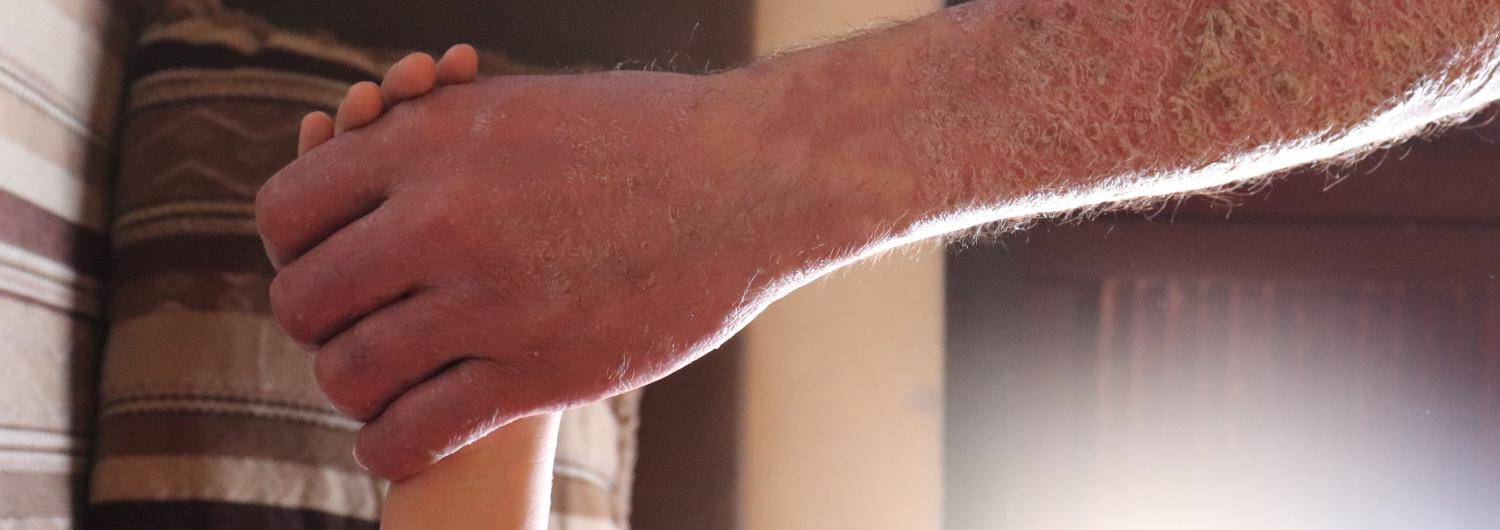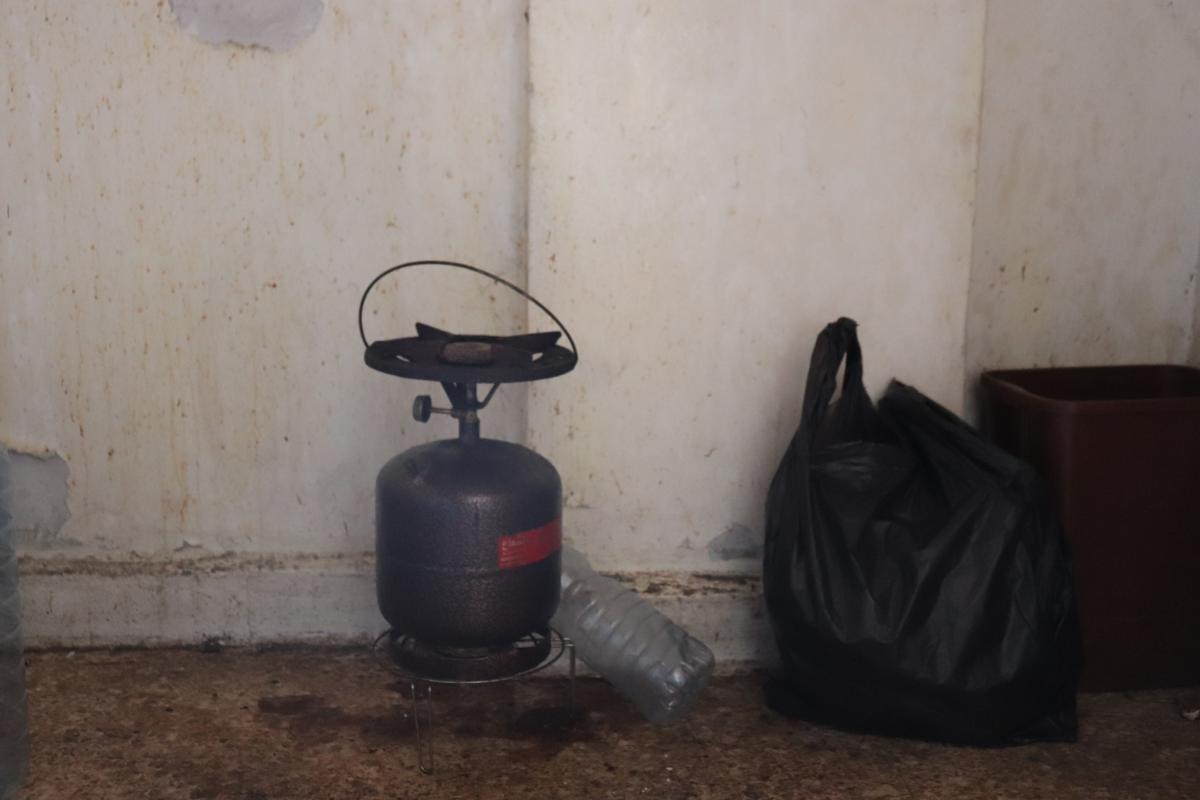Stories
Living in the abyss, the story of Muhib

Muhib who is suffering from a skin disease, eczema, and his 5 years old daughter Dalia holding hands in their house in Sin El Fil, Beirut. (Elena Garcia Serra/Action Against Hunger)
How the economic crisis in Lebanon has caused distress on a family’s lives
“I was thinking of selling all the furniture in my house and trying to cross the sea by boat with the asylum seekers from the northern port city of Tripoli to escape the country’s financial meltdown with my daughter. When I saw the news of the migrant boat sinking and all those men, women, and children who died, I immediately changed my mind because I didn’t want to see Dalia (Muhib’s daughter) drown in front of my eyes”.
These are the words of Muhib[i], a 39-year-old Lebanese man who is unemployed and lives with his 5-year-old daughter Dalia in Sin El Fil, Beirut.
The dire situation of Muhib is caused by the economic crisis that started in 2019 in Lebanon. The Beirut blast that happened on the 4th of August 2020 made the situation worse. The blast killed around 200, injured 6,000, and severely damaged buildings and infrastructure, and displaced around 250,000 people all around the city. The protracted crises and the accumulation of events dropped the gross domestic product (GDP) to 18.08 billion USD in 2021 compared to 51.61 billion USD in 2019.
Muhib lost everything after the port explosion. Before the blast, he was working and able to buy medication for his severe eczema. But since the blast, medicines became almost unavailable and very expensive in the country, so he could not afford them anymore and his eczema worsened. Because of this, Muhib had to stop working.
Muhib who is suffering from a skin disease, eczema, and his 5 years old daughter Dalia holding hands in their house in Sin El Fil, Beirut. (Elena Garcia Serra/Action Against Hunger).
The increase of the price of medicines is just a reflection of the country’s inflation. According to official statistics, total inflation from December 2019 to October 2021 reached 519%, while the price of food and non-alcoholic beverages increased by 1874% in the same period[i]. This caused more than half of the Lebanese population to now have an income below the poverty line, including Muhib, and multidimensional poverty[ii] in the country doubled from 42% in 2019 to 82% in 2021 [iii]. It was also estimated that in 2021, 1.3 million people were food insecure,  190,[iv].
Action Against Hunger responded to Muhib’s critical situation
Action Against Hunger aims to alleviate the suffering of families like Muhib’s through Food Security and Livelihoods interventions. During 2021, we reached a total of 6,277 individuals (including 2,626 females) in Lebanon in this sector of intervention.
With the support of the French Embassy, Action Against Hunger provided nutrition activities, including infant and young child feeding promotion, and distributed Multi-Purpose Cash Assistance to families that need it the most in Beirut. So far under this program the project has been able to reach 607 households, including approximately 3.035 individuals.
Muhib receives Multi-Purpose Cash Assistance from Action Against Hunger:
“I only receive assistance from Action Against Hunger, and I want to thank you for standing beside us.”. He tells us that he used the cash to pay a few months of rental fees, so he makes sure that he and Dalia have a roof during the next months, he used the remaining money to buy food. “Before the cash assistance, I was selling my furniture to get money to buy food. I sold the oven, the gas bottle, our TV, A/C unit, and the washing machine.” – Muhib explained.

The small stove that Muhib uses to cook in his house in Beirut after selling the kitchen stove together with other furniture to get money to buy food. (Elena Garcia Serra/Action Against Hunger)
Despite the assistance, the dire economic situation in the country and the inflation is making it difficult for Muhib and his daughter to access basic needs. Just to mention a few, he can’t buy certain types of food, he has just a few hours of electricity a day, because he cannot afford a fuel generator so he can’t use the refrigerator, and he also does not have enough water for domestic use.
As he explains, “I’m only able to buy rice, potato, salt, sugar, and oil. I can’t buy chicken, red meat, fruits, or vegetables, they are pricey. I’m not able to buy beans now neither, even Zaatar and Picon (traditional ingredients) now are expensive… This affects my daughter’s health, and she is deprived of nutritious food, toys, and new clothes….”
Muhib and Dalia live in a very fragile situation. Given the protracted crisis and the deterioration of the socio-economic situation of the country, there is an increasing number of people in need of humanitarian assistance, there is a need to ensure a sustainable response for families like Muhib’s.
“The only thing that I think about is my daughter. I don’t care about myself, I only care about my daughter and her future.” – Muhib.
[i] Central Administration of Statistics, Economic Surveys, Inflation in figures. http://www.cas.gov.lb/index.php/economic-statistics-en
[ii] The Multidimensional Poverty Index produced by UNDP and the Oxford Poverty and Human Development Initiative, measures poverty by considering various deprivations experienced by people in their daily lives, including poor health, insufficient education, and a low standard of living.
[iii] UNESCWA, Multidimensional Poverty in Lebanon (2019-2021), September 2021. Available at: Multidimensional poverty in Lebanon (2019-2021): Painful reality and uncertain prospects - ESCWA (unescwa.org)
[iv] REACH report (conducted by UN agencies and NGOs), Multi Sector Needs Assessment (MSNA) 2021, April 2022, for Lebanese, PRL and migrants (REACH-MSNA_2021_Report_Leb_Mig_PRL_April-2022.pdf (impact-repository.org)
[i] Aliases are used for the interviewees instead of their real names to protect their identities.
JOIN US
Donate now
Your donation will reach those who most need it
Become a member
Join the generation that can bring an end to hunger
Donate via SMS
send HAMBRE to:
- 28010(1.2€)
- 38010(6€)
- 38012(3€)
Full donation to our projects. Valid for Movistar, Vodafone, Orange and Yoigo